
Mother Nature Should Feel “Berry” Sorry! This Poor Faribault Farm!
It's all fun and games until it gets too hot for food to survive the heat.

I can't argue, this week hasn't been so bad, but last week was pretty brutal (as my red skin can attest).
The heat caused a dumpster fire, irritated the lakes, and now, it has shortened the lifespan of Minnesota berries.
Straight River Farm, a family-owned and operated produce farm in Faribault closed their Pick-Your-Own Berries for the rest of 2021.
Minnesota's weather is nothing, if not unpredictable. May's late frost stunned many of the farm crops, and then the extended hot, dry weather wreaked havoc upon the produce for a second time. It's as if Mother Nature was out for revenge this year.
The farm raises strawberries, raspberries, blueberries, melons, and apples, all while using sustainable practices. They are devastated to see a shortened season.
Straight River Farm took to Facebook to make the announcement.
The post explained that they picked everything ripe in four hours yesterday. This would have been unthinkable in previous years. The business will salvage what it can in the upcoming weeks and sell the fruit at local markets.
The announcement disheartened followers. Eight-five users responded with likes, hugs, and tears, and twenty-two people shared the disastrous news.
Karen N wrote:
"So sad to read this news. We've been going for 15 years and make jam to last the whole year through till next season. So hope that next years weather is kinder to your crops!"
"Which farmers markets are you at. We would buy 50 pounds"
Many other users wrote their condolences and affirmed their commitment to return next year.
At the end of the post, they encourage visitors to try out Lorence's Berry Farm in Northfield or Miracle Strawberry Farm in Dodge Center.
LOOK: The most expensive weather and climate disasters in recent decades
More From KRFO-FM









